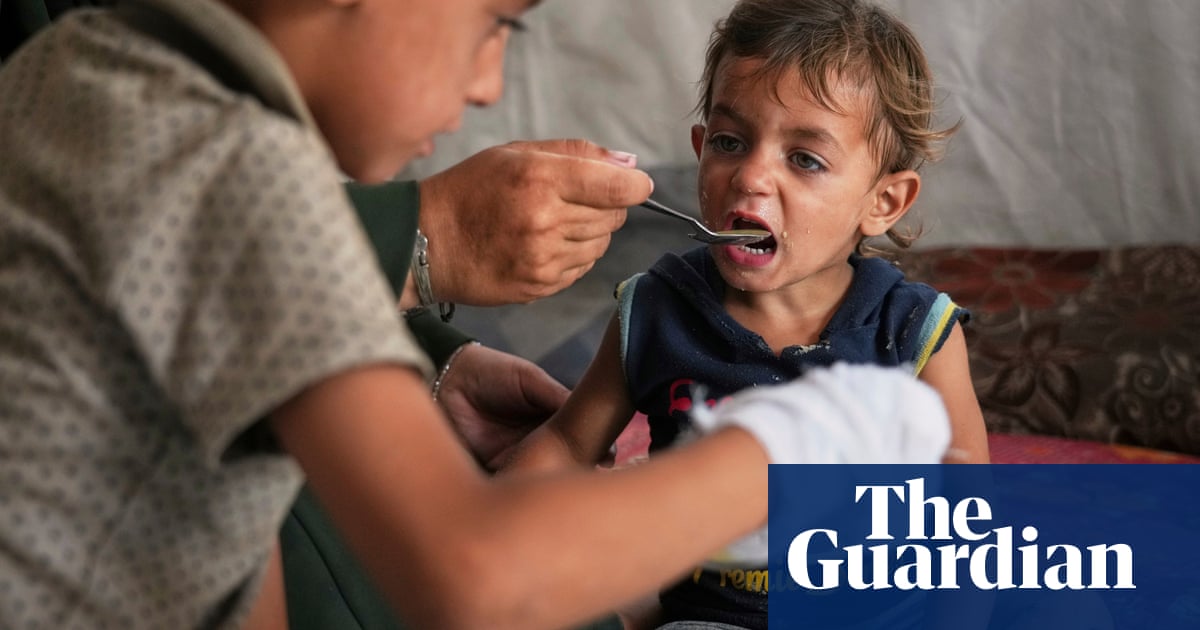Good morning.
The UN’s humanitarian chief, Tom Fletcher, told the BBC this morning that14,000 babies could diein Gaza in 48 hours if aid did not reach them in time. Five aid trucks entered Gaza on Monday but Fletcher described this as a “drop in the ocean” and totally inadequate for the population’s needs.
It followed the director general of the World Health Organization, Tedros Adhanom Ghebreyesus, saying yesterday that2 million people were starvingin the Gaza Strip while “tonnes of food is blocked at the border” by Israel.
The leaders of the UK, France and Canada yesterday condemned Israel’s“egregious actions”in Gaza and warned of joint action if Israel continued. Meanwhile, Palestinians began fleeing Khan Younis as Israel ordered people to “evacuate immediately” before an “unprecedented attack” that the military says is targeting Hamas infrastructure.
What else is the UN saying about Israel’s aid blockade, in place since 2 March?A UN-backedreportrecently estimated that one in five people in the territory were facing starvation. The UN posted a statement on Monday reading: “Everyone in Gaza is hungry. Without immediate action, nearly a quarter of the population could be pushed into famine. Food aid must be allowed into Gaza now to prevent a catastrophe.”
Here’s what the Israeli prime minister, Benjamin Netanyahu, has said:Israel decided on Sunday to resume the entry of a“basic quantity” of food, after coming under increasing international pressure. But yesterday Netanyahuhit backat the UK, France and Canada for condemning Israel, calling on them to follow Donald Trump’s example.
What’s the latest with Israel’s ongoing military bombardment?Gaza’s civil defence agency said Israel hadkilled at least 44 people in Gaza today. Al Jazeera reported that Israeli forcesbombed a pharmaceutical laboratory. Hundreds of people have been killed in the past week, many of them women and children, as Israel’s attacks haveintensified.
Vladimir Putin and Donald Trump held arare two-hour phone callyesterday, but the Russian leader declined to support a US-proposed 30-day unconditional ceasefire, to which Ukraine had already agreed.
Putin also suggested his country’s maximalist objectives in the war with Ukraine were unchanged. Ukraine’s president, Volodymyr Zelenskyy, insisted Ukraine was ready for a full ceasefire and direct negotiations with Moscow, but said: “If the Russians are not ready to stop the killings, there must be stronger sanctions.”
How did Trump tryto spin the call?He posted optimistically on Truth Social: “The tone and spirit of the conversation were excellent … Russia and Ukraine will immediately start negotiations toward a Ceasefire and, more importantly, an END to the War.”
But…Trump later suggested the US could abandon its involvement, telling reporters that if there was no progress, “I’m just going to back away”.
Against the odds, the ceasefire that followed Indian and Pakistan’s almost-war has held; fragile, uneasy but still unbroken. Yet in the aftermath of four days of cross-border strikes, the question remains:what now?
While India and Pakistan have both claimed victory, some experts fear that a return to hostilities is almost inevitable.
Here’s the view from India:Analysts say New Delhi has not emerged as triumphant as hoped, leaving little room for further de-escalation. The prime minister, Narendra Modi, has said the military offensive against Pakistani terror groups, named Operation Sindhoor, was ongoing and that the ceasefire was simply a “pause”.
And from Pakistan:The army, after going through a period of reputational decline, is once again the country’s most revered institution – proving that nothing works better for the fortunes of Pakistan’s generals than an altercation with India.
The murder of the Colombian influencerMaría José Estupiñánis being investigated as a possible femicideand has triggeredwidespread outrageover Colombia’s failure to protect women.
Mexico is grieving two cadets from the country’s navywho were killed on Saturday when a training shipcrashed into the Brooklyn Bridge.
The American director Wes Anderson mocked Donald Trump’s planto impose tariffs on foreign-made films, saying itwould be unworkable.
At least 50 Venezuelan men sent by the Trump administration to a prison in El Salvador hadentered the country legally, according to the Cato Institute. “The government calls them all ‘illegal aliens’. But of the 90 cases where the method of crossing is known, 50 men report that they came legally.”
The Guardian journalist and the Brazilian Indigenous expert were murdered while investigating the impact of deforestation. In this posthumousbook extract, Phillips reflects on encounters with the rainforest and its people.
In recent years, Paris has undergone transformations in efforts to become a greener, more pedestrian-friendly city. This commitment to sustainability and livability is on full display in the north-westernneighborhood of Clichy-Batignolles.
“The cost of my Spotify subscription recently went up, so I cancelled it and went back to my old CD-buying ways,”writesRich Pelley. “Instead of listening to random suggestions, I’m back to my own musical free will.”
First Thing is delivered to thousands of inboxes every weekday. If you’re not already signed up,subscribe now.
If you have any questions or comments about any of our newsletters please emailnewsletters@theguardian.com
